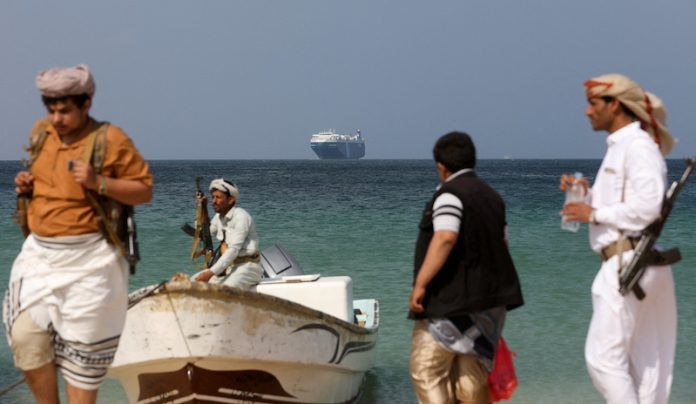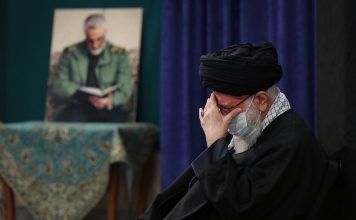
By Ahmad Rafat
A dangerous power struggle is unfolding in the Red Sea caused by recent developments. The “Axis of Resistance,” led by the Islamic Republic, is posing a major economic challenge to the Western powers in a region that holds great economic and geopolitical importance on the world map.
The latest reactions by the U.S. and the UK to the ongoing events show their grave concern over the security situation in the Red Sea. The safety of commercial shipping and global seaborne trade is the priority of countries in the U.S., Europe, the Middle East, and Asia.
The Red Sea connects the Bab al-Mandab Strait to the Suez Canal, a major commercial shipping route, and accounts for approximately 12 percent of global trade and 30 percent of seaborne trade. The capacity of container ships carrying various products through this corridor has increased by 400 percent in the past 25 years, making the Houthis attack an even more urgent concern.
The Islamic Republic has been quick to deny reports that it has had a hand in provoking the current crisis, insisting that Ansar Allah, the military arm of the Yemeni rebel group Houthis, has been acting independently in support of the Palestinians in the Gaza Strip. However, the weapons used by Ansar Allah to attack commercial ships in the Red Sea have all been undoubtedly manufactured by the Islamic Republic.
[aesop_image img=”https://kayhanlife.com/wp-content/uploads/2023/12/2023-11-20T180021Z_604573532_RC25H4A8BWW5_RTRMADP_3_ISRAEL-PALESTINIANS-YEMEN-HOUTHI.jpg” panorama=”off” credit=”Houthi military helicopter hovers over the Galaxy Leader cargo ship as Houthi fighters walk on the ship’s deck in the Red Sea in this photo released November 20, 2023. REUTERS./” align=”center” lightbox=”on” captionsrc=”custom” captionposition=”left” revealfx=”off” overlay_revealfx=”off”]
Meanwhile, the U.S. and the UK have adopted a tough stance against the Houthis and the Islamic Republic, warning that they would respond decisively if the attacks continue. So far, 11 other countries have joined the U.S.-led coalition to counter attacks by Ansar Allah.
Besides the U.S., France, Italy, Greece, Britain, the Netherlands, Denmark, Spain, Canada, Norway, Bahrain, and Seychelles have joined the coalition. Saudi Arabia is notably not a coalition member: It has pointed out that its participation could lead to a dangerous situation.
“The coalition could lead to a war which the Middle East cannot cope with currently,” warned Eyad Alrefai, a faculty member at King Abdelaziz University in Jeddah, Saudi Arabia.
Although both sides have tried to manage the crisis to avoid a serious confrontation, a slight miscalculation could spark a new war. The United Arab Emirates (UAE) has adopted a similar stance to Saudi Arabia and refused to join the coalition.
The significance of the Red Sea as a shipping corridor is illustrated by an accident that caused the closure of the Suez Canal in 2021 — and, according to international insurance companies, inflicted $70 billion in financial damages to the global economy.
In 1956, Britain, France, and Israel attacked Egypt after Egyptian President Gamal Abdel Nasser nationalized the Suez Canal. The military attack, aimed at regaining control of the Suez Canal, resulted in its five-month closure.
Given today’s vastly increased volume of international trade, an extensive closure of the Suez Canal would inflict irreparable damage to the global economy and could even cause its collapse.
Iran Seizes Oil Tanker Involved in U.S.-Iran Dispute in Gulf of Oman – State Media
The significance of this shipping corridor is not limited to enabling tankers to transport oil and gas from the Gulf States and the Sea of Oman to Europe and to several Asian countries. It also is a significant route for bringing industrial products, food, and medicine to countries in the region.
The shipping route’s closure could simply paralyze the global economy, given the rapid globalization of the economy and ever-increasing dependency on the supply chain.
Commercial ships must first navigate through the Suez Canal and then the Bab al-Mandab Strait, with Yemen and Djibouti on either side, through the Horn of Africa. The inability to pass through the Bab al-Mandab Strait forces commercial ships to navigate around the African continent, adding at least two weeks to their travel time.
In short, the closure of the Bab al-Mandab Strait – which translates as the Gate of Grief, the Gate of Lamentation, or the Gate of Tears — could be painful to the global economy, and in fact bring it to tears.
Besides its economic significance, the Red Sea holds particular strategic importance. It shares borders with Israel, Egypt, Jordan, and Saudi Arabia and also borders Sudan, Eritrea, Djibouti, and Yemen.
Iranian President Ebrahim Raisi’s Defense Minister, Mohammad Reza Ashtiani, has claimed that the Red Sea is under “Iranian control,” and warned that “no one can conduct maneuvers in the region under our control.”
This is an unfounded claim. Unlike Saudi Arabia, Eritrea, Egypt, Sudan, and Yemen, Iran has no borders with the Red Sea.
Djibouti is also the gateway to the Red Sea for other countries in the Horn of Africa, including Somalia and Ethiopia.
The Somali Civil War led to the creation of gangs of pirates who posed a serious threat to commercial ships for years. According to some estimates, Somali pirates inflicted $20 billion worth of damage annually to global trade during the five years when they were most active.
Every country claiming to be crucial to international politics and the global economy must recognize the safety and security of the shipping corridor in the region. Djibouti currently provides permanent bases to the American, French, Italian, Japanese, and Chinese naval forces. The UAE had a military base in Djibouti until 2015, when it moved its forces to Eretria.
Saudi Arabia occupies a significant part of the Red Sea’s eastern shoreline. The most extensive Saudi naval base is in Jeddah, on the Red Sea. Russia has also been trying to establish a permanent military base on the Red Sea.
Several countries that do not have permanent naval bases in the region have deployed their warships to the area, including Britain, France, Germany, Egypt, Turkey, Idia, Australia, and Canada. Iran recently deployed its Alborz Destroyer to the Red Sea. The Red Sea has joined the South China Sea, the Persian Gulf, and the Mediterranean Sea as the bodies of water with the highest number of military ships navigating through them.













